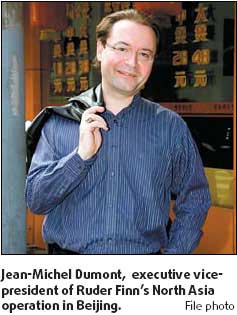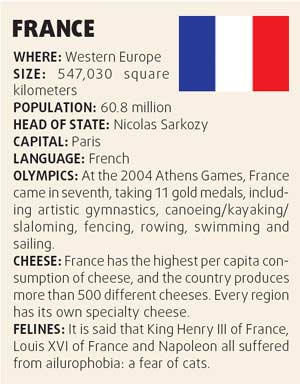When Jean-Michel Dumont first came to Beijing after whooping it up at the Brazilian Carnival in Rio de Janeiro in 1986, the capital city seemed "gray and dull". Little did he know that this would be where he would spend the next 21 years -- and perhaps the rest of -- his life. "I have to admit, my first impression wasn't the best one," the 46-year-old Parisian said. "But within two months, it was my favorite city."
Very quickly, he formed powerful friendships among locals and foreigners that have endured until today. He also found that he shared many Chinese values, such as respect and "face".
"By the time I returned to France to close my home there, I would have never considered living anywhere else," he said.
Dumont first came to China to found Interasia Public Relations, which was later became China's first PR joint venture. Unlike the other PR firms operating in the country at the time, which were both huge and international, Dumont's firm helped only French companies enter the Chinese market.
"Doing business at that time wasn't easy, and you felt very cut off from the rest of the world," he recalled.
He recalled that then, it was difficult to get access to information and people. Calling Europe could take eight or nine hours from the time dialing until the connection was made. While he now still pushes an 11-hour workday, he said that with today's infrastructure, he could make contact with 50 or 100 people, rather than just a handful.
And Dumont said that his job has changed in other ways, too. He explained that when he first arrived, his firm could use a single press pack for all media, because Chinese media and consumer interests then were relatively uniform. "Today, everything we do needs to be segmented in several ways, which shows how society has been fragmented," he said.
In 1992, he sold Interasia to Edelman, and today works as the executive vice president of Ruder Finn's North Asia operation. He spends his time off doing more or less the same thing he does at work: banqueting.
"I do it the Chinese way, going to dinner and lunches and drinking and eating with friends," he said, adding that this has always been a great way for him to connect to the Chinese people. "This is the biggest bridge between the French and Chinese: We love to drink and eat."
Dumont said when he first came to China, most expats came from huge firms for long-term placements. And many of them buckled under the stress.
"Making it in China is all based on the ability to adapt and always being able to question yourself," he said. "I've always felt completely at home in China - not from the first day I arrived but from the two months after."
And 21 years in, he has no plans to leave. "As long as I work, I want to work here," he said.
By Erik Nilsson
(China Daily June 1, 2007)


